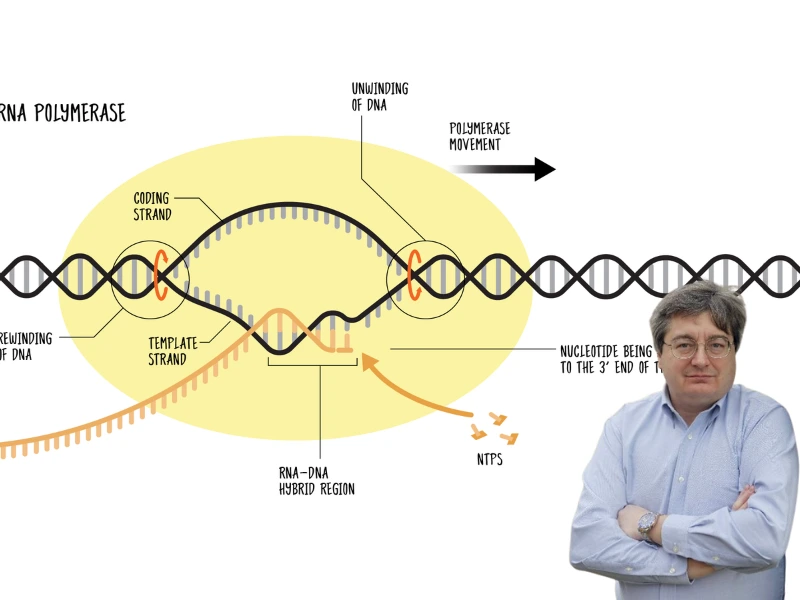Richard H. Ebright: A Pioneering Molecular Biologist
Early Life and Education
Richard H. Ebright is a well-known American molecular biologist whose research has revolutionized the genetics and microbiology fields. His research on RNA polymerase and transcription regulation has opened doors to many scientific breakthroughs. His interest in science was apparent from a young age, and he went on to accomplish great things in his life. This article explores his life, education, scientific achievements, and lasting impact that he has left in the scientific fraternity.
Early Life and Background
Birth and Childhood
Richard H. Ebright was born in the United States of America, and his enthusiasm for science was exceptional from an early age. He was a child with curiosity who always wanted to know about the natural world. Books, experiments, and support from his teachers as well as his family members stimulated his early interest in science.
Family Influence
Ebright’s family was important in influencing his scientific way of thinking. His parents identified his ability early in life and encouraged him to learn. His mother, especially, gave him books and materials that fueled his interest. This firm educational foundation assisted him in building a solid understanding of scientific concepts.
Education and Academic Pursuits
High School Achievements
Richard H. Ebright was more than an average student; he was good at studies and was interested in science fairs and competitions with keenness. While studying at high school level, he received several awards for his projects. His excellence caught the attention of several scientists.
College and University Education
Ebright continued his education at Harvard, where he continued to develop his research skills. At Harvard, he conducted several scientific projects, including molecular biology and genetics. His educational path was characterized by important findings and contributions to his discipline.
Career Beginnings
After graduating, Ebright started working in scientific research. His early career involved trying to understand how gene regulation worked. His perseverance and creative approach made him a great scientist. Ebright’s early research provided the foundation for later discoveries. His research into bacterial transcription mechanisms offered insights into genetic information expression.
Major Scientific Contributions
Work on Molecular Biology
Richard H. Ebright made significant contributions to molecular biology, particularly in the study of RNA polymerase, the enzyme responsible for transcription in cells. His research helped in understanding the intricate details of gene expression.
Discoveries in RNA Polymerase
One of Ebright’s greatest accomplishments is his research on RNA polymerase. He found out how this enzyme works, and it led to significant findings regarding the process of genes being turned off and on.
Impact on Genetics and Biotechnology
Ebright’s work has been crucial in the creation of new genetic engineering methods. His discoveries have uses in medicine, agriculture, and biotechnology to enable scientists to manipulate genetic material for different uses.
Awards and Recognitions of Richard H. Ebright
1. Prestigious Scientific Awards
Ebright’s pioneering work in molecular biology, particularly his research on RNA polymerase and gene regulation, has led to multiple awards from esteemed scientific societies. Some of the most notable awards include:
- National Science Foundation (NSF) Awards: Recognized for his significant contributions to molecular genetics and microbiology.
- Howard Hughes Medical Institute (HHMI) Investigator Award: Honoring his excellence in scientific research and innovation.
- American Academy of Microbiology Fellowship: A prestigious recognition granted to top researchers in microbiology.
- National Academy of Sciences Recognition: Highlighting his impact on molecular biology and genetic research.
2. University and Institutional Honors
Many renowned universities and research institutions have recognized Richard H. Ebright’s contributions with honorary titles, fellowships, and distinguished lectureships. These include:
- Harvard University Distinguished Alumni Recognition: acknowledging his significant achievements in the field of biology.
- Rutgers University Board of Governors Professorship: Honoring his long-term commitment to education and research.
- Honorary Doctorates from Leading Universities—Awarded by various institutions for his exceptional scientific contributions.
3. Research and Innovation Grants
Due to his groundbreaking discoveries, Ebright has been awarded several prestigious research grants that have allowed him to continue his work in molecular biology. These include:
- NIH (National Institutes of Health) Grants: Funding support for his research in gene transcription and regulatory mechanisms.
- HHMI Research Grants: Supporting his innovative approaches to genetic studies.
- Biotechnology and Medical Research Grants: Provided by government and private organizations recognizing the impact of his research on medicine and biotechnology.
4. Global Recognition and International Awards
Ebright’s work has not only been recognized in the U.S. but also internationally. Some of his global recognitions include:
- International Molecular Biology Award: Honoring his significant contributions to the field on a global scale.
- Collaboration with Nobel Prize-Winning Scientists: His research has been cited and appreciated by Nobel laureates in the field of genetics.
5. Contributions to Science Education and Mentorship
In addition to his scientific research, Richard H. Ebright has been recognized for his efforts in mentoring young scientists and students. He has received awards for his dedication to education and inspiring the next generation of researchers, such as:
- Excellence in Teaching Award: Recognized by institutions for his commitment to student education.
- Mentorship Awards from Scientific Societies: Honoring his role in guiding and inspiring young researchers.
Collaboration and Influence in the Scientific Community
Ebright has collaborated with top researchers and institutions worldwide. His work has influenced many in the field of genetics and microbiology, inspiring new generations of scientists to explore complex biological processes.
Publications and Research Papers
Ebright has authored and co-authored several research papers published in high-impact scientific journals. His publications continue to be widely referenced in studies on molecular biology and transcription.
Challenges and Obstacles in His Career
Like any scientist, Richard H. Ebright faced challenges in his career. From funding issues to experimental failures, he overcame obstacles with determination and innovative thinking, proving that persistence is key in scientific research.
Personal Life and Interests Beyond Science
Despite his intense focus on science, Ebright also has interests outside of research. Whether it’s mentoring students or engaging in scientific outreach programs, he remains committed to sharing knowledge and inspiring future scientists.
Legacy and Impact on Future Scientists
Richard H. Ebright’s work has left a lasting impact on the field of molecular biology. His research continues to shape modern scientific advancements, ensuring that his legacy endures for generations.
Richard H. Ebright’s Role in Modern Science
Ebright’s contributions are not just historical but also highly relevant in today’s scientific world. His findings are still being used to develop new treatments and biotechnology applications.
1. Advancing Molecular Biology and Genetics
One of Ebright’s most impactful contributions is his extensive research on RNA polymerase, the enzyme responsible for copying DNA into RNA. His studies have provided deep insights into:
- How genes are turned on and off in bacterial and human cells.
- The mechanisms of transcription regulation, which is essential for cellular function.
- The development of new genetic tools for studying gene expression and mutations.
His findings have helped scientists understand the fundamental processes of life at a molecular level, shaping the way researchers study DNA, RNA, and proteins today.

2. Contributions to Medicine and Drug Development
Ebright’s work has direct applications in medicine, particularly in the development of antibiotics and treatments for bacterial infections. His research has contributed to:
- Understanding bacterial resistance to antibiotics, which is a major global health concern,.
- Developing new drugs that target RNA polymerase, making them effective against antibiotic-resistant bacteria.
- Advancing studies on genetic disorders by uncovering how transcription errors contribute to diseases.
3. Impact on Biotechnology and Genetic Engineering
Ebright’s discoveries have also played a major role in biotechnology, where gene editing and molecular cloning techniques are used to develop new medical and agricultural products. His work has influenced:
- CRISPR and gene-editing technologies, which rely on understanding gene transcription.
- Synthetic biology, where scientists design and modify genetic sequences for practical applications.
- Biotechnological innovations in agriculture, such as genetically modified crops that resist pests and diseases.
Influence on Young Researchers and Students
Ebright has mentored and inspired countless students. His dedication to education and research has helped nurture a new wave of scientists eager to follow in his footsteps.
Quotes and Key Lessons from His Work
Richard H. Ebright’s career teaches us valuable lessons about perseverance, curiosity, and the importance of scientific inquiry. His words and research serve as motivation for aspiring scientists.
Conclusion
Richard H. Ebright’s life and work are a testament to the strength of curiosity and perseverance in scientific discovery. His work in molecular biology and genetics has revolutionized the field, opening doors for future breakthroughs. His legacy inspires scientists and researchers across the globe, showing that passion and effort can bring about revolutionary discoveries.
Also read APJ Abdul Kalam Biography
FAQs
What is Richard Ebright famous for?
Richard H. Ebright is famous for his groundbreaking research in molecular biology, particularly his work on RNA polymerase and gene regulation. His discoveries have significantly advanced genetics, biotechnology, and medicine, helping scientists understand how genes are turned on and off in cells.
How did Richard Ebright become a scientist? (Class 10 Explanation)
Richard Ebright developed a passion for science as a young boy. His mother nurtured his inquisitiveness by giving him books and scientific materials. He joined science fairs and research competitions while still a student and won numerous awards for his experiments. His perseverance and passion for finding things propelled him to Harvard University, where he studied molecular biology and eventually became an accomplished scientist.
What did Richard Ebright do at the age of 22?
At the age of 22, Richard Ebright was already conducting advanced scientific research as a young scholar at Harvard University. During this time, he made important contributions to the study of cellular processes and genetics, laying the foundation for his future discoveries in molecular biology.
রিচার্ড ইব্রাইট কিসের জন্য বিখ্যাত?
রিচার্ড ইব্রাইট আণবিক জীববিজ্ঞান (molecular biology) এবং জিন নিয়ন্ত্রণ গবেষণার জন্য বিখ্যাত। তার গবেষণা RNA পলিমারেজ (RNA polymerase) এবং জিন প্রকাশের নিয়ন্ত্রণ ব্যবস্থা সম্পর্কে গুরুত্বপূর্ণ তথ্য প্রদান করেছে, যা আধুনিক জিনতত্ত্ব এবং ঔষধ বিজ্ঞানে বড় ধরনের অবদান রেখেছে।




Attractive part of content. I simply stumbled upon your blog and in accession capital to say that I acquire actually loved account your blog posts. Anyway I’ll be subscribing for your augment and even I fulfillment you get admission to persistently rapidly.
Rattling great visual appeal on this site, I’d rate it 10 10.
Thank you for the auspicious writeup. It in fact was a amusement account it. Look advanced to far added agreeable from you! By the way, how can we communicate?
As I web-site possessor I believe the content matter here is rattling fantastic , appreciate it for your hard work. You should keep it up forever! Best of luck.
I think this site contains very good written content posts.
I have read a few good stuff here. Definitely value bookmarking for revisiting. I surprise how much attempt you put to make one of these great informative web site.
Hi, Neat post. There’s a problem with your web site in internet explorer, would test this… IE still is the market leader and a big portion of people will miss your excellent writing because of this problem.
Im not certain the place you are getting your information, but great topic. I must spend a while studying more or working out more. Thank you for fantastic info I used to be searching for this information for my mission.
I am sure this piece of writing has touched alll the internet viewers, its
really really nice post on building up new website. https://Hallofgodsinglassi.wordpress.com/
I just couldn’t depart your site before suggesting that I extremely enjoyed the standard information an individual provide for your guests? Is going to be again regularly to check up on new posts.